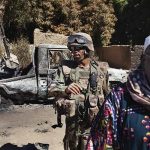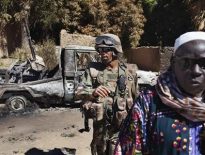(Reuters) – Algerian forces have found the bodies of two Canadian Islamist fighters after a bloody siege at a desert gas plant, a security source said on Monday, as the death toll reached at least 80 after troops stormed the complex to end the hostage crisis.

Algerian Prime Minister Abdelmalek Sellal is expected to give details on Monday about the siege near the town of In Amenas, which left American, British, French, Japanese, Norwegian, Filipino and Romanian workers dead or missing.
Much remains unclear about events after the jihadists staged the attack last Wednesday. However, an Algerian newspaper said they had arrived in cars painted in the colors of state energy company Sonatrach but registered in neighboring Libya, a country awash with arms since Muammar Gaddafi’s fall in 2011.
The Algerian security source told Reuters that documents found on the bodies of the two militants had identified them as Canadians, as special forces scoured the plant following Saturday’s bloody end to the crisis.
Veteran Islamist fighter Mokhtar Belmokhtar claimed responsibility for the attack on behalf of al Qaeda, and an official Algerian source has said the militants included people from outside the African continent, as well as Arabs and Africans.
A security source said on Sunday that Algerian troops had found the bodies of 25 hostages, raising the number of hostages killed to 48 and the total number of deaths to at least 80. He said six militants were captured alive and troops were still searching for others.
A Japanese government source said the Algerian government had informed Tokyo that nine Japanese had been killed, the biggest toll so far among foreigners at the plant. Six Filipinos died and four were wounded, a government spokesman in Manila said.
The raid has exposed the vulnerability of multinational-run oil and gas installations in an important producing region and pushed the growing threat from Islamist militant groups in the Sahara to a prominent position in the West’s security agenda.
Algerian President Abdelaziz Bouteflika has ordered an investigation into how security forces failed to prevent the attack, the daily El Khabar said. The militants had used nine cars in Sonatrach colors and all with Libyan registration plates, it quoted unnamed security sources as saying.
Algerian Tahar Ben Cheneb – leader of a group called the Movement of Islamic Youth in the South who was killed on the first day of the assault – had been based in Libya where he married a local woman two months ago, it said.
ONE-EYED JIHADIST
Belmokhtar – a one-eyed jihadist who fought in Afghanistan and Algeria’s civil war of the 1990s when the secular government fought Islamists – tied the desert attack to France’s intervention across the Sahara against Islamist rebels in Mali.
“We in al Qaeda announce this blessed operation,” he said in a video, according to Sahara Media, a regional website. About 40 attackers participated in the raid, he said, roughly matching the government’s figures for fighters killed and captured.
Belmokhtar demanded an end to French air strikes against Islamist fighters in neighboring Mali. These began five days before the fighters swooped before dawn and seized a plant that produces 10 percent of Algeria’s natural gas exports.
U.S. and European officials doubt such a complex raid could have been organized quickly enough to have been conceived as a direct response to the French military intervention. However, the French action could have triggered an operation that had already been planned.
The group behind the raid, the Mulathameen Brigade, also threatened to carry out more such attacks if Western powers did not end what it called an assault on Muslims in Mali, according to the SITE service, which monitors militant statements.
In a statement published by the Mauritania-based Nouakchott News Agency, the hostage takers said they had offered talks about freeing the captives, but the Algerian authorities had been determined to use military force.
“We opened the door for negotiations with the Westerners and the Algerians, and granted them safety from the beginning of the operation, but one of the senior (Algerian) intelligence officials confirmed to us in a phone call that they will destroy the place with everyone in it,” SITE quoted the statement as saying.
BLOODY SIEGE
The siege turned bloody on Thursday when the Algerian army opened fire, saying fighters were trying to escape with their prisoners. Survivors said Algerian forces blasted several trucks in a convoy carrying both hostages and their captors.
Nearly 700 Algerian workers and more than 100 foreigners escaped, mainly on Thursday when the fighters were driven from the residential barracks. Some captors remained holed up in the industrial complex until Saturday when they were overrun.
The bloodshed has strained Algeria’s relations with its Western allies, some of which have complained about being left in the dark while the decision to storm the compound was being taken.
Nevertheless, Britain and France both defended the military action by Algeria, the strongest military power in the Sahara and an ally the West needs in combating the militants.
Among other foreigners confirmed dead by their home countries were three Britons, one American and two Romanians. The missing include five Norwegians, three Britons and a British resident. An Algerian security source said at least one Frenchman was also among the dead.
The raid on the plant, which was home to expatriate workers from Britain’s BP, Norway’s Statoil, Japanese engineering firm BGC Corp and others, exposed the vulnerability of multinational oil operations in the Sahara.
However, Algeria is determined to press on with its energy industry. Oil Minister Youcef Yousfi visited the site and said physical damage was minor, state news service APSE reported. The plant would start up again in two days, he said.
Algeria, scarred by the civil war with Islamist insurgents in the 1990s which claimed 200,000 lives, insisted from the start of the crisis there would be no negotiation in the face of terrorism. France especially needs close cooperation from Algeria to crush Islamist rebels in northern Mali.
(Additional reporting by Anton Slodkowski in Tokyo, Balazs Koranyi in Oslo, William Maclean in Dubai, Estelle Shirbon and David Alexander in London, Brian Love in Paris and Daniel Flynn in Dakar; Writing by David Stamp; Editing by Giles Elgood)





